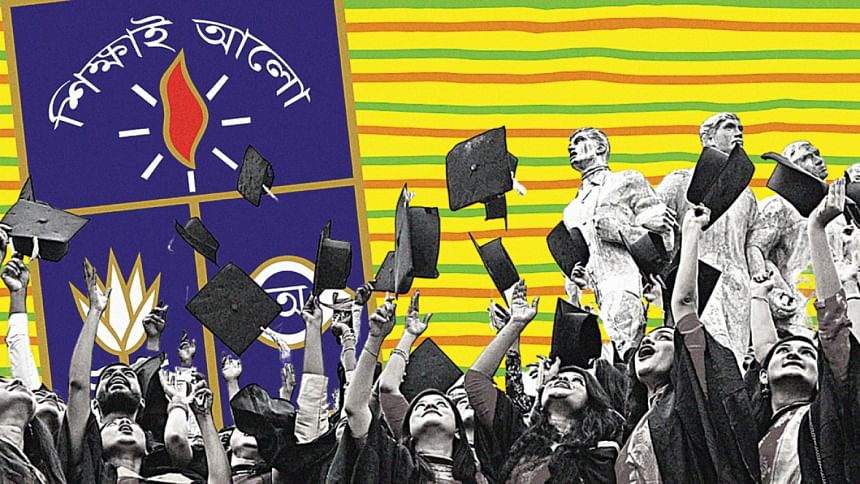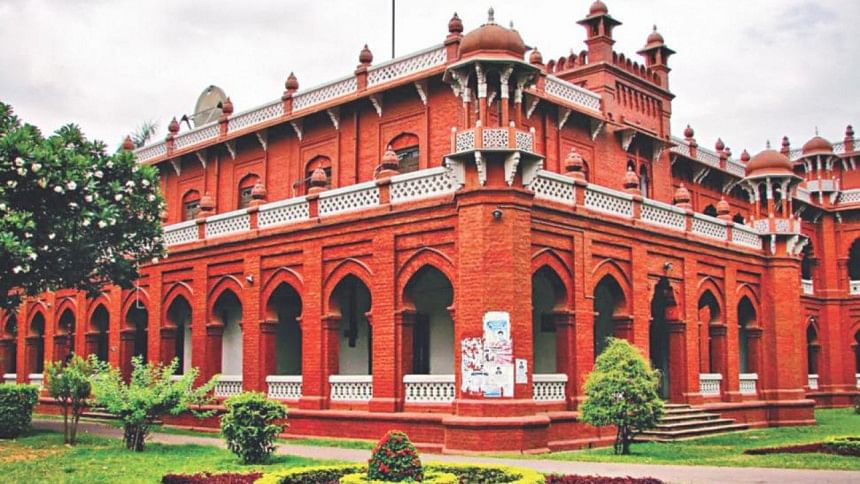Reflections on University of Dhaka convocation speeches: Part I

One of the best ways to learn about the past 100 years of the University of Dhaka, for those proud of its history and truly concerned about its future, is to read the two volumes of Dhaka University: The Convocation Speeches, Volume 1, 1923-1946 and Volume 2, 1948-1970 (Dhaka University Publications, 1989). Professor Emeritus Serajul Islam Choudhury compiled these volumes thoughtfully, as well as diligently, editing and then seeing them lovingly into print almost on his own over 30 years ago. Anyone who sifts through the speeches delivered by successive Chancellors, Vice-Chancellors and Convocation Speakers almost annually, and ponders on why there is no third volume to this important undertaking, that is to say for the next 50 years, will have a reasonably good perspective on the inherently political nature of this unique institution, the advantages that it derived from its political heritage, as well as the limitations it has to suffer from politicking that is inherently indifferent to humanistic higher education and bent on self-satisfaction. One will be able to also understand then why, in this centenary year, we have abundant reasons not only to take pride in the institution's past, but also reflect soberly over the difficult and even turbulent historical terrains it has had to negotiate, and understand the problems it will forever have to deal with, as new dispensations replace old ones.
As Professor Choudhury points out in his introduction, the convocation speeches "recorded some of the ideas and views which shaped the University of Dhaka and were themselves influenced by the working of the university itself". What the speakers said on each convocation gathering, notes Professor Choudhury, gives readers "a very intimate knowledge of, and a reliable insight into its character and characteristics". As he observes at the end of his introduction, "To read these speeches chronologically is to see history unfolding itself, physically". What follows in the rest of this piece is a kind of overview, necessarily superficial as well as highly selective, of some of the noteworthy speeches of the first volume—noteworthy, let me emphasise, in the light of the nation's as well as the university's history. My overview is meant to be representative and not exhaustive.

In his inaugural Chancellor's speech, Lord Lytton (1946-1947) declared that he felt that the already two-year-old university was "Dacca's greatest possession" and destined to "do more than anything else to increase and spread the fame of Dacca beyond the limits of Bengal or even of India itself". He predicts that in no time at all will people find that the "Dacca-trained student is a superior man" (we now know there were two women who were amongst the first batch of students of the institution!).
He provides also the raison d'etre of the university: it was a "splendid Imperial compensation" for the annulment of the partition of Bengal offered to the predominantly Muslim population of the region. The university that resulted, he emphasises, though designed to be the "chief center of Muhammadan learning" in this part of undivided India, was also meant to be secular and "a seat of learning and not a mere employment agency", a place that would enable its students to ultimately take charge of their own and the region's destinies.
Let me now move to 1925 and Vice-Chancellor PJ Hartog's parting speech. An able administrator and educator, Hartog had by this time served the university well for four years. As he prepared to leave it, he felt happy that he had not merely overseen the expansion of the university's physical facilities and its growth as a centre of learning but also as the place he had envisioned it to be: "a great university uniting the science and culture of the East and the West and achieving new things by a new synthesis". Hartog also goes on to stress that the institution he had nurtured till it was ready to walk upright was the positive result of the union of "corporate action and common endeavor and high ideals, not depending on any one man for its continuance because it had been implanted in many minds and hearts".

Fast forward to Vice-Chancellor AF Rahman's speech in 1934, where he does his duty on the occasion by reporting on "the nature of the work that is being carried on in this university". He stresses that though the province has been suffering economically, "the university has maintained its high academic standard", "undisturbed" too "by any political movement" affecting the subcontinent then because of the bourgeoning anti-British campaigns. Among its noteworthy achievements, he emphasises, is the increase in the number of women students— 23 at this time! He stresses that the time has come to recruit women faculty members. He adds that in a time of growing tension, the university must play its part in "softening the bitterness that unfortunately exists" between India's two major religious communities.
Fast forward once more to the 1936 speech by Vice-Chancellor RC Majumdar, a distinguished historian of India. He is proud to note how the university's graduates have gone on to become members of the Bengal Legislative Assembly. Professor Majumdar, like all Vice-Chancellors before or after him, reports on the expansion of the university in terms of student strength, faculty recruitment, and infrastructure, but points out too why it needs generous donations from East Bengalis and has to supplement money received from the government and student fees thus. Another area of concern for him is to see that the powers that are in Bengal do not interfere in the university's workings overmuch and that they take into account "the considered views of the university" in their actions.
One of the best speeches by a Convocation Speaker Professor Serajul Islam Choudhury has been able to retrieve in this volume is that by Mirza K Ismail, the Diwan of Hyderabad. Speaking in 1942, that is to say, 20 years after the establishment of the University of Dhaka, he recalls that the institution had been conceptualised as of "a type new to modern India and a model of its kind" in its residential makeup. It was to be a place for students to pursue "a strenuous life of high endeavor and great ideals", made distinctive by "distinguished teachers [who] would develop a quiet but far-framed intellectual center" , a place where there would be a synthesis of all that is good in the East and the West".

Mirza Ismail is aware of the problems in the way—financial, political, social, and communal—for it was "a storm-racked world" that graduates would be stepping into in the era of the Second World War and the Partition. The university and the city, Professor Majumdar notes regretfully, had recently witnessed "communal disturbances', no doubt brought about in response to the discord of the pre-Partition period in the subcontinent. But the Diwan believes that DU graduates have been equipped to handle even these depressing times and step out of them to build their country anew.
The last convocation speech I would like to use before concluding is by Professor Mahmud Hasan, the Vice-Chancellor who supervised the University of Dhaka's transition from a colonial institution to one in a country that had just achieved independence. But instead of commenting on it, let me end by quoting at some length his 1946 overview of the first 25 years of the University of Dhaka:
Has the University fulfilled the purposes for which it was established? Perfection is not attainable in the world, and the ideal can never be realized fully. The University of Dacca has made mistakes and it has not always made the best use of its opportunities; but on the whole, it has undoubtedly done its work satisfactorily, and education has taken a great step forward in East Bengal and there is a renaissance and re-awakening among Muslims of Bengal… This University is the agency through which East Bengal particularly… will benefit and progress, and I appeal [to the British government]… and to people of east Bengal, Hindus, Muslims, Christians, etc… to give it every help, facility and encouragement.
Words spoken in 1946 but still in so many ways relevant for all of us delighting in the university's birth centenary—pandemic or no pandemic—proud about its past and concerned about its future. Professor Emeritus Serajul Islam Choudhury surely deserves our thanks for compiling on his own in 1989 this and the other volume of the convocation speeches covering the period from the founding of the university to 1970. The university press people, too, deserve our thanks for printing these volumes recording important aspects of the institution's history through the convocation speeches.
The second volume Professor Choudhury has presented for us continues to reveal the university's progress in the East Pakistan phase of Bangladesh's history. The convocation speeches assembled indicate that the University of Dhaka continued to develop as a "seat of learning" and contributed to the flowering of the nation's culture. We learn directly or indirectly how the university was affected by political events and how it negotiated adverse situations. The fact that this is a much slimmer volume is revealing of tumultuous periods of the nation's as well as the university's history. The fact that Justice Abu Sayeed Chowdhury's 1970 Vice-Chancellor's speech is in Bangla is also revealing (India's President at that time, Pranab Mukherjee, gave his Convocation Speaker's address in 2013 in Bangla as well).
And why is there not a third volume of convocation speeches? Thereby hangs a tale. The first convocation held after the country's liberation was in 1999, when Professor Azad Choudhury delivered the Vice-Chancellor's speech and Professor Amartya Sen was the Convocation Speaker. The university had to negotiate some more turbulent years in the new century during the caretaker government interregnum. The nation's politics impacted on it again and again in subsequent years, and the last convocation was held in December 2019 where Professor M Akhtaruzzaman gave the Vice-Chancellor's speech and the Convocation speaker was a Japanese Physics Nobel Laureate. And now we have the pandemic with us for the second year. The third volume of convocation speeches will be some time in the coming, but it will be something to look forward to for anyone delighting in an institution that has completed its first century!
Fakrul Alam is UGC Professor, Department of English, University of Dhaka.

 For all latest news, follow The Daily Star's Google News channel.
For all latest news, follow The Daily Star's Google News channel. 



Comments